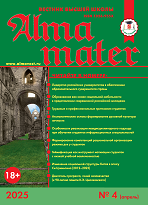https://doi.org/10.20339/AM.06-18.021
M.S. Inkizhekova is Dr.Sci. (Philosophy), prof. at Ural Law Institute of the Ministry of Internal Affairs of the RF
Examined are possibilities of pedagogical provocation, carried on the basis of philosophical concepts. The author notes, that pedagogical provocation as situation, actualizing reflexive and creative activity of students, contributes to formation of critical thinking, i.e quality necessary for formation of harmonious and socially active personality. Turning to the phenomenon of philosophical provocation, the author states, that essence of philosophical provocation is in pulling person out of frames of ordinary, familiar, everyday being, pushing it into spirited world of living thoughts, meanings, innermost questions of their existence. On example of Socrates and F. Nietzsche’s philosophical teachings, included in educational practices, the author shows possibilities of formation of critical thinking, so necessary in principal spheres of vital activity of person.
Key words: pedagogical provocation, philosophical conception, critical thinking, reflection.
References
1. Glukhova, A.V. To the question about the role of provocation in politics. The Power. 2016, no. 3, pp. 92–96.
2. Druzhinin, A.M. Communicative practices. Philosophical and methodological analysis. Moscow, 2005.
3. Dmitriev, A.V., Zadorozhnyuk, I.E. Sabotage: the vagueness of the concept and the unchanging nature of the phenomenon. The Person. 2016, no. 3, pp. 20–35.
4. Dmitriev, A.V. Provocation and it’s reflection in M. Zoshchenko’s early stories. In: Reflexive processes and management. Moscow, 2015, pp. 34-37.
5. Ermakova, A. The Japanese provocation by Philip Stark. Arkhidom. 2007, no. 4, pp. 70–73.
6. Zemlyanoy, S.N. Instigators of history. The phenomenon of provocation in Russian political life and literature. Moscow, 2004, pp. 131–173.
7. Kantor, V.K. “Diary of the writer” by Dostoyevsky as provocation of the Imperial crisis in Russia. Problems of literature. 2007, no. 1, pp. 228–249.
8. Kantor, V.K. Magical provocation. “Fire angel” by Bryusov in the context of the Silver age. Problems of philosophy. 2012, no. 2, pp. 132–135.
9. Kravchenko, S.A. Actual problems of provocation: new risks in politics, culture, communications. Sociology of education. 2016, no. 6, pp. 113–116.
10. Koblenkova, D. Creativity as a provocation: А. Strindberg in Swedish and Russian literary studies. Problems of literature. 2012, no. 6, pp. 452–468.
11. Martirosyan, K.V. Cultural provocation as psycho-pedagogical methods in the teaching of psychology in bi-ethnic groups. Psychology of education. 2017, no. 7, pp. 71–86.
12. Plato. Collected works in 4 vols. Vol. 2. Moscow, 1993, pp. 81–134.
13. Sivishkina, M.E. Technique of cultural provocation in the study of the stereotypes of love and family in the minds of modern students. Siberian psychological journal. 2015, no. 56, pp. 177–192.
14. Soltanova, L. Art provocation: a bold look at art: how to organize an exhibition of works by local artists. Biblio Field. 2017, no. 7, pp. 36–40.
15. Sokolov, B. Velvet provocation Pierre and Gilles. New world of art. 2007, no. 2, pp. 42–44.
16. Criminal code of the Russian Federation. URL: http: // www.garant.ru
17. Shemetova, T.N. The art of provocation and the perfect provocateur. Observatory of culture. 2014, no. 1, pp. 11–17.











.png)






